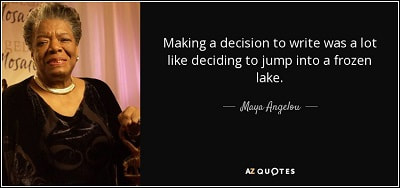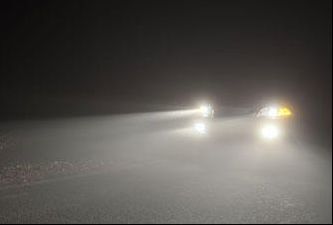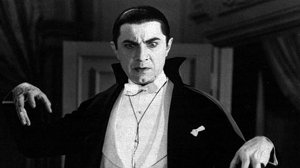 When I'm reading memoirs by writers they'll often say at what point in their life they knew they wanted to be a writer. Sometimes this revelation happens at an early age, sometimes it doesn't register until the person is 60+. In some cases, it seems this is a profound revelation, there is no doubt, it's a feeling within, one of surety. Sometimes it's a shocking decision. As the wonderful Ms Maya Angelou says, her decision to write was '...like deciding to jump into a frozen lake.' However it happens, writing is the path, the destiny, no matter how ill-considered, difficult or daunting it may appear at the time. Did this happen for you? As a little girl, I was painfully shy. I clung to my Mom's skirts, hiding, and I hated to be out of her sight or away from her at all. I was a blue-eyed, blonde pig-tailed little mutt who cried if the check out operator smiled at me and said, 'Hello' as she rang up Mom's groceries. That shyness clung to me for years. I couldn't say what I felt because I was too shy, so I wrote it down. I read a lot from a very young age. Books featured highly in our house, and my sister and I both spent hours losing ourselves in their pages. Reading encouraged me to write. The more I wrote, the better I became at expressing my thoughts, feelings, and observations through words, and when I received a pat on the back by a teacher for my 'creative work' , and it was read out in front of the class, well, that was like fuel to my growing rocket boosters. I'm not embarrassed to admit that yeah, heck yeah, I love the praise that comes from completed work that 'goes public' and people congratulate you and say that your work changed their life, they enjoyed it, or the writing helped them in some way. My very first book launch for Welcome to the Amazon Club was a pinnacle of achievement like none other in my life, and I doubt there's nothing quite like that first celebration, watching people line up to buy your book and then ask you to sign it. Now that's something. So if I am asked when did I know I was a writer, I'd have to say, 'I've always done it, it's just what I do. Writing has always been a part of my life. It was my first real and honest form of communication'. I disappoint people when I say I never made a conscious sit-down-at-the-table-and-think-seriously decision about becoming a writer. Sure, I dreamed about that kind of life, how it would be to write full time and be famous. When I was working cutting up salad vegetables in a restaurant kitchen, or at the telephone company (what was then Pacific Northwest Bell in Seattle) listening to people complain about their broken phones and exorbitant bills, or driving around as a courier in Atlanta on a mind-blowingly energy-sapping typical Georgia hot summer's day, I did dream of doing what I imagined a writer would do: get up whenever, work for a few hours in a fabulous place with a view, walk in the park after lunch and then enjoy an early dinner and drink with other fabulous artists like myself, and of course fit in book launches, signings and author talks all over the place ... oh yes, I sure did. I just never believed that person could be me, and my present-day reality of the writing life has turned out to be somewhat different. Not a lot of glamour! But I do have the time and space to give to my writing now, a gift I've denied myself for years because my writing always took second place to earning a living cutting up vegetables, dodging guard dogs while trying to deliver courier packages, or listening to Dr. Tordekon who would call me from his spaceship (actually a telephone both on a Seattle street corner) to regale me with stories of his outer space adventures. The writing was always there. You could say it has toughed it out, through thick and thin, insistent, wanting and waiting to be heard, and maybe that's how you know you're a writer - you need to be, the feeling never goes away, no matter what you do. Eventually, you have to pay attention.
0 Comments
 American novelist E.L. Doctorow said that writing is ..."like driving a car at night. You never see further than your headlights, but you can make the whole trip that way." It’s OK to begin writing a story or novel and not know where it's going. After reading a jolly good book, I'll often think to myself, "I bet they had a really strong idea of that story and where it would begin and end." On second thought, a safer bet might be that the writer didn't have had a clue when they started the story that Mrs. Smith next door would end up dumping her house, car, cat and goldfish on her husband and taking off to the south of France with the pool guy. Having said that, you may be writing a who-dunnit, or some other work that requires a carefully thought out plot, so that you know where you're going and can get from A to Z without losing your way. I have a terrible time with plot, mainly because my characters never do what I want them to do. It's a dead certainty that they take on lives of their own and make decisions independent of their creator (i.e. me). Many years ago I tried my hand at writing a thriller. I wasn't good at the genre. I gave it a go, clumsily plodding along, a bit like that game Cluedo where Colonel Mustard murdered Mrs. Peacock in the library with a candlestick. Eventually, my characters got so fed up with this bumbling and plodding that placed them in boring and stupid situations, that one of them walked out, slammed the door in disgust and went off to join the French Foreign Legion. So how do I write? I have a terrible time with beginnings and endings, so I just start somewhere - maybe with a character, or a snippet I heard or have been thinking about that I like the sound of, something that will lead me into my story. It's a haphazard and risky way to start , certainly not with any structure in mind, but it is this not knowing, this sense of discovery, that gives the work momentum and pace, keeps me trucking along, because I want to know, 'what is going to happen next?' Such a writing process requires faith, and that's grown within me over many years, faith I have now to 'wind her up and let her go ...'. Easier said than done sometimes because I get anxious, apprehensive, doubt my ability to put even one sentence together. But, as my Mom always used to say, 'The show must go on'. Let your first draft go where it needs and wants to. There is ample time for the editing, shaping and plotting and structuring later on. Let your imagination lead the way.  I love horror movies. I'm reassured in this because I know I'm not alone. Lots of people love them - just not many of my friends who look at me funny when I confess. I was raised on them. I get it from my Mom. She was a hard-core veteran, scared to death as a child by the old black and whites, like Dracula with Bela Lugosi and The Mummy with Boris Karloff and The Phantom of the Opera with Lon Chaney. She and her friends used to get so traumatised they'd hide under the seats on the wooden floor. The usher would come along and tell them they either had to sit in the seats or leave. As youngsters growing up in Seattle, my sister and I were often bundled up in bathrobes, pyjamas and slippers, loaded into the car and taken to the drive-in movies. I guess it was one way that my parents could have a night out without all the hassle of getting babysitters. Mom's passion for horror meant the movies we went to were double features in brilliant, ghastly Technicolor, bright red blood everywhere. My sister and I took all of this in as we chugged down hotdogs and Coke, and then, satiated with salt and sugar and fat, nodded off to sleep in the midst of the gore and screams emanating through the drive-in. All these years later, I can still remember the title of a film we saw at the drive-in, The Atom Age Vampire, a film produced in 1960. You can see it on YouTube. Of course! These days though, I am continually disappointed. I haven't seen a really good horror in ages, and I see plenty. I have a friend, a stalwart horror fan, who watches even more horrible movies than I, and it take something pretty special to impress her. She's tougher, a real critic. It takes a mega-horror/slasher/blood-spattered mess to shake her foundations. However, in saying that, there have been a few memorable times when we've been watching something hideous together, and take terrified glimpses through fingers-over-eyes. I'm not ashamed to admit it. So what makes for great horror? If you're going to write in this genre, whether it's for film or written word, I reckon you need to do some homework because it's an art form, a talent, and it takes study and diligence. Watch lots and read lots. Stephen King is one of the best horror writers in my book because he has this unerring talent to turn the everyday - the routines, the surroundings, the actions we live with - into horror. He understands our fears and turns them into stories. For example, take his novel It, set in a small American town. It features average, kind of normal families and kids doing kid-like stuff, and begins with a little boy chasing his paper sailboat down a roadside gutter in a rainstorm; the little boat sails down a drain, the kid is upset, peering down the culvert, and then there's a clown down in the drain who says hi and asks the kid if he wants his boat back. Of course he does. Every kid likes clowns, and they're fun and trustworthy right? Maybe a bit cheeky but OK, yeah? And then the horror comes. You have to love ghosts and goblins, ghouls and gremlins, and the evil and horror that lies within all of us. Have a go. Write that scary thing. As Stephen King says, "... as a writer, one of the things that I've always been interested in doing is actually invading your comfort space. Because that's what we're supposed to do. Get under your skin, and make you react." |
Archives
January 2024
|